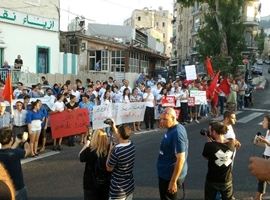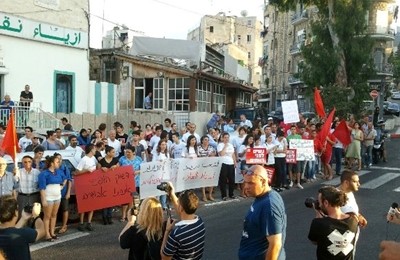
A new survey of Arab-Palestinians citizens of Israel following waves of anti-Arab activity shows that most have not given up on Israeli society, but instead express strong support for social activism to advance Arab issues, general social problems, and an end to the occupation, according to a news report published by Dahlia Scheindlin on +972 website.
With so much nastiness directed against them, it wouldn’t be surprising if Arab citizens have given up on Israel. But with insufficient polling and reporting on public opinion in the Arab community, it can be hard to know. And this is an important time to know how one-fifth of the population thinks. The current Knesset has proposed a slew of bills directed against this community; unprecedented “Price Tag” racists attacks have targeted Arab sites in Israel including mosques, cemeteries and business establishments.
Further, it’s been a tough six decades in general for Arabs in Israel. Until 1966, Arab areas fell under martial law, not unlike occupation; discrimination in housing, education, labor markets and fund allocations is the norm, and then in October 2000, 13 Arab citizens were killed by police, creating a profound rift. Since then, voter turnout among Arabs has dropped significantly relative to Jews; and now the current Knesset seems hell-bent on booting them out of the Israeli family, in feeling and in fact.
According to Sheindlin: “Instead, the results showed a high sense of belonging in Israel and a strong spirit of activism. Arabs support the summer’s social protest, bucking both initial suspicion from the protest leaders, and cynicism among the Arab press and leadership. Many Arabs report participating, and many more are open to joining in the future. The survey also reveals a strong core of committed and experienced activists, who support social engagement and partnership with like-minded Jewish citizens. This group feels more alienated and more concerned with the Palestinian cause than others, but not at the expense of local social causes. It looks like an emerging portrait of the next generation of Israel’s Arab leaders”.
The occupation of the Palestinian territories is a high priority: When asked what they feel is the most urgent problem in Israel today for the government to solve, “ending the occupation,” ranks first out of seven items, with 32%. Yet social issues, combined, rank even higher: poverty/social gaps (15%), economy (13%), education (8%), democracy (4%) – total 40% together. Tension between Jews and Arabs is third priority, with 14%.
Before the summer social protests, a healthy one-quarter (23%) of Arab respondents said they have been involved in some sort of social activism. Support for the social protests is high. Roughly 60% consistently supports the social protests in various questions asked in my recent survey. This is lower than roughly 81% among Jews and 59% say they share the same problems expressed by the leaders of the J14 protests. 63% personally support the protests even if they did not participate themselves. 71% think Arabs should participate, even when read the argument that Arabs should not participate because the protests are about Jewish issues and leave Arabs out. Despite lower support than Jews, 19% of Arabs reported participating in the protests – including virtually – the same rate of Jews who reported participating in a different survey. If the social protest leaders embrace Arab issues, this activism could rise further: Were the protest leaders to declare that ending the occupation, providing solution to Arab housing problems, and improving the Arab education system are integral to greater social justice in Israel, large portions said this would raise their desire to participate in the future – 47%, 51%, and 57%, respectively.
Read full story by Dahlia Scheindlin



